Hard waste collection day is a designated period when local authorities arrange to collect and dispose of substantial and bulky items that cannot be handled through regular trash services. It is vital to keep our neighbourhoods clean and ensure responsible waste management. For one to make the very most of this opportunity, it’s crucial to plan and prepare effectively. Whether you’re a first-timer or looking to improve your disposal process, these tips will help you navigate the collection day smoothly and responsibly, maximising the benefits for you and the environment. This blog post will provide eight tips for a successful hard waste collection day.
1. Understand the Hard Waste Collection Process
Before the collection day, gathering information about the process is essential. Research the collection’s date, time, and location in your area. Familiarise yourself with any specific guidelines or restrictions that may be in place. Understanding the process will help you prepare adequately and avoid any potential issues during the collection.
2. Plan and Organise:
Planning and organising are vital to ensuring a successful hard waste collection day. By following these great tips, you can streamline the process and maximise the opportunity to responsibly dispose of your unwanted items.
● Take inventory of all the things and items you want to dispose of. Categorise them based on their types, such as furniture, appliances, or electronics. This will help you assess the quantity and prioritise the items for disposal.
● Determine the reusability of the items. Consider whether any can be donated, repurposed, or reused instead of thrown away. This reduces waste and benefits others who may find value in your unwanted items.
● Remove any non-disposable items from the designated collection area to declutter and prepare for the collection day. Organise the remaining items orderly, ensuring they are easily accessible for collection.
● Check the local guidelines and regulations set by the waste management authorities in your area. Understand any restrictions on certain materials or items that may not be accepted during the collection.
Planning and organising effectively make the hard waste collection day a smooth and efficient process, contributing to responsible waste management and a cleaner environment.
3. Prepare Large Items
If you have huge items to dispose of, taking extra steps to ensure their successful removal is crucial. Measure the dimensions of these items to ensure they can be safely transported. Evaluate whether disassembling or breaking down certain items is necessary to facilitate their removal. Additionally, cleaning and repairing minor damages can increase the chances of someone reusing or recycling these items, contributing to a more sustainable disposal process.
4. Research Alternative Disposal Methods
While hard waste collection is an excellent opportunity to dispose of large items, alternative disposal methods for specific materials are worth considering. Research local recycling options for electronics, batteries, or hazardous waste. Explore donation or resale opportunities for items in good condition. By exploring these alternatives, you can reduce landfill waste and promote a circular economy.
5. Coordinate with Neighbors
Involving your neighbours can make the hard waste collection day more efficient and impactful. Inform your neighbours about the upcoming collection and encourage their participation. Consider organising a collective effort, such as a neighbourhood cleanup day, where everyone can pool resources or share disposal costs for large or bulky items. Collaboration fosters community engagement and strengthens the positive impact of the collection day.
6. Prepare for Collection Day
To ensure a smooth collection day, make the necessary preparations. Set a reminder to ensure you know the designated collection day and mark it on your calendar. Put your items out the night before or early on collection day, following any specific instructions provided by the waste management authorities. Properly placing your items at the designated collection point ensures easy pickup and minimises potential disruptions.
7. Practice Safety and Security
During the disposal process, it’s important to prioritise safety and security. Take precautions while moving or transporting heavy items, using proper lifting techniques and protective gear as necessary. Avoid placing items out for collection too early to prevent scavenging or unauthorised dumping. This reduces the risk of items being taken or strewn across the neighbourhood. Report any illegal dumping to the appropriate authorities to maintain a clean and safe community.
8. Reflect and Evaluate
After the hard waste collection day, take a moment to reflect on your experience and evaluate the process. Assess what went well and also identify areas for improvement. Consider sharing your learnings with others through conversations with neighbours or by writing about your experience.
Conclusion
A successful hard waste collection day requires understanding the process, planning, and organisation. By implementing these eight tips, you can maximise the benefits of hard waste collection, contributing to a cleaner and more sustainable community. Responsible waste management is essential for preserving our environment and reducing landfill waste. People should take action and ensure that their hard waste is disposed of properly, positively impacting their surroundings. Together, people can create a greener future for generations to come.

